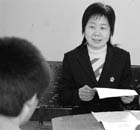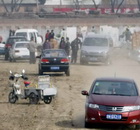Opinion
Economists see possible turnaround in US-China currency row
(Xinhua)
Updated: 2010-04-06 16:50
 |
Large Medium Small |
BEIJING - The US decision to delay its report on exchange rate policies could bring a turnaround in the recent currency dispute with China, economists believe.
Treasury Secretary Tim Geithner announced Saturday to delay a report to Congress on international economic and exchange rate policies, which might indicate whether China is manipulating its currency exchange rate.
The report was originally scheduled for April 15.
US President Barack Obama's top economic adviser Lawrence Summers said Sunday that Geithner's decision was a right one as the United States will hold a series of high-profile meetings with China in the next three months.
Those meetings include a Group of 20 (G20) meeting of finance ministers and central bank governors in Washington later this month, a Strategic and Economic Dialogue (S&ED) with China in May, and a G20 summit in June.
Summers said strengthened negotiations with China and other countries is the best way to safeguard US interests.
Wang Yong, a researcher at Peking University, told Xinhua that the Untied States has realized that pressuring China on its currency policy would not solve the problems.
Once the US-China currency issue escalates, it will affect not only trade and investment of the two countries, but also the regional and global economy as well, Wang said.
The United States is reluctant to see such a result, as it would have more to lose than gain, Wang said.
Sun Mingchun, chief economist for the Chinese market at Nomura Securities, said the Obama administration would remain inclined to cooperate with China, while it was some congressmen who were pressurizing the government on domestic political reasons.
"The majority of Chinese exports are low-end products with high price sensitivity. So US punitive tariffs based on the exchange rate issue might result in a huge drop of China's exports to the US market."
|
||||
US labeling China as "a currency manipulator" would simply lead to a scenario where both countries would suffer, he added.
An economist, with the International Monetary Fund (IMF), who refused to be named, also forecast China's tough response to hostile moves from the US side over the exchange rate issue.
"That will be destructive to a global economic recovery," the economist said.
Wang of Peking University said the two countries still need each other.
"Obama showed eagerness to cooperate with China upon taking office. Despite the many frictions between China and the United States since the beginning of this year, the need for strategic cooperation did not evaporate overnight," said Wang.
"Cooperation brings far more benefits than confrontation will."
He believed that the two countries should find a solution through various dialogue channels.
It is widely accepted by economists that the adjustment of China's currency exchange rate would be vital in restructuring China's development model. But any adjustment should be decided independently by China, with an eye on its own economic condition rather than as a result of outside pressure.













